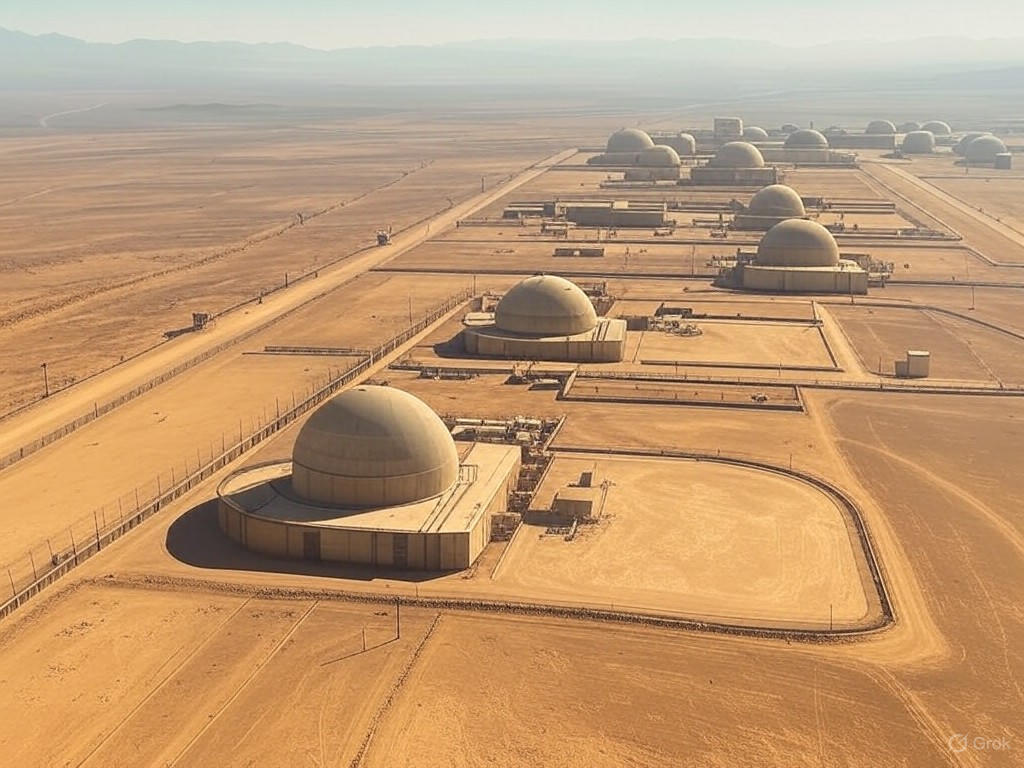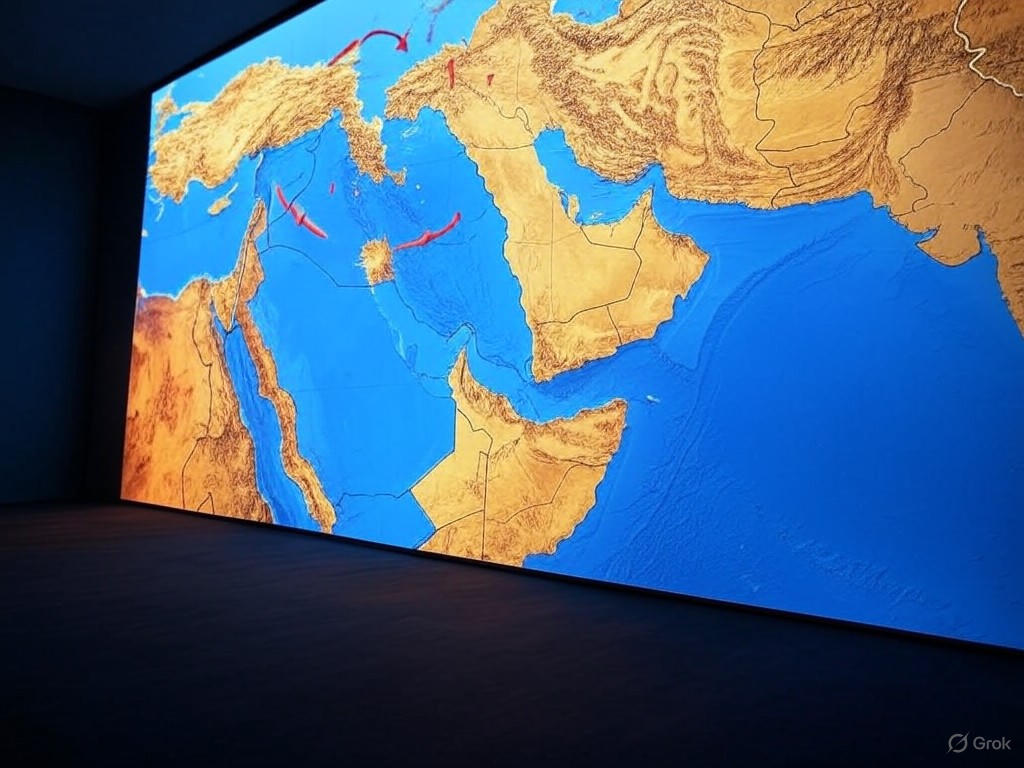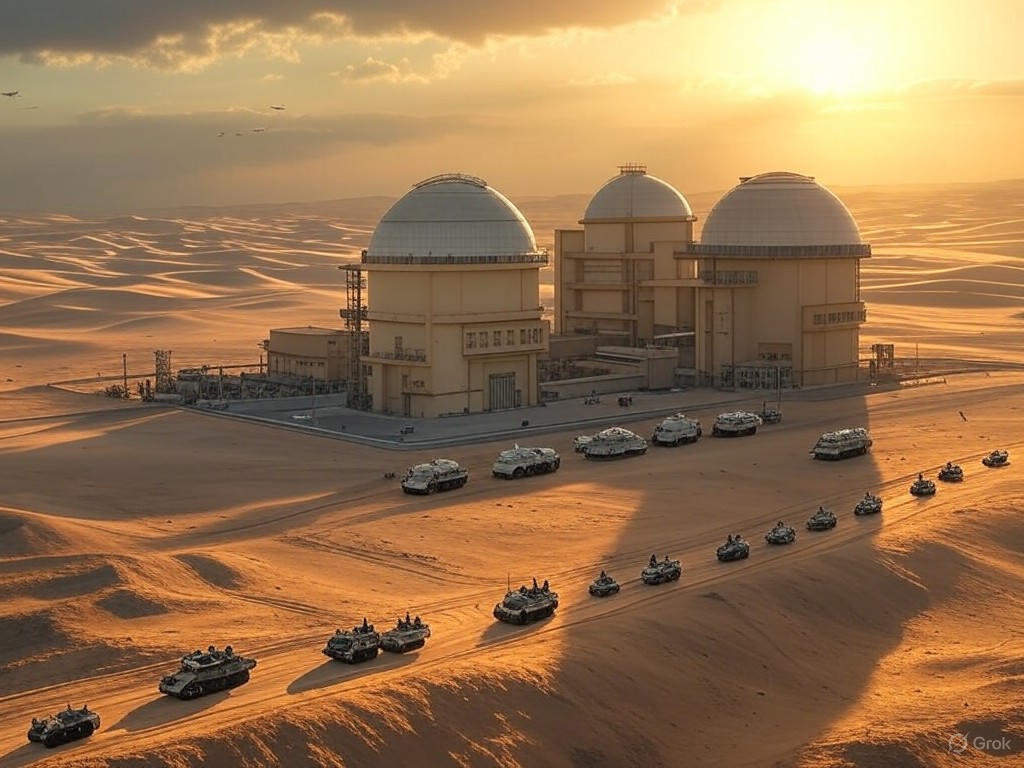Iran’s Nuclear Ambitions: Middle East Tensions Rise
In the vast expanse of the Middle East, where ancient sands whisper tales of empires risen and fallen, a modern shadow looms large over the horizon. Iran's nuclear program, a complex web of scientific pursuit and geopolitical maneuvering, stands as a pivotal challenge to regional stability and global peace. As a nation with a rich cultural heritage and a strategic position at the crossroads of continents, Iran’s advancements in nuclear technology raise profound questions about security, sovereignty, and the delicate balance of power. Yet, amid the tensions, there remains an opportunity for prudent diplomacy and free-market principles to guide us toward a more stable future. This editorial examines Iran’s nuclear developments, their ripple effects on Middle East geopolitics, and the international responses, including sanctions, that shape the path ahead.

This satellite view of Iran's Natanz enrichment site captures the scale of its nuclear infrastructure, a symbol of both technological ambition and international concern.
The Advancements in Iran’s Nuclear Program: A Double-Edged Sword
Iran’s nuclear program has evolved dramatically since the 1950s, when it first embarked on atomic energy research under the Atoms for Peace initiative. Today, it represents a sophisticated blend of scientific innovation and strategic defiance. Reports from the International Atomic Energy Agency (IAEA) indicate that Iran has significantly enriched uranium, with stockpiles now exceeding limits set by the 2015 Joint Comprehensive Plan of Action (JCPOA). As of late 2023, Iran’s uranium enrichment levels have approached 60% purity— perilously close to weapons-grade material—prompting alarm bells in capitals from Washington to Riyadh IAEA Report on Iran.
From a center-right perspective, this progress underscores the risks of unchecked government intervention in scientific endeavors. Iran’s state-directed nuclear efforts, heavily subsidized by the regime, highlight how centralized control can distort innovation. In contrast, free-market economies thrive on private-sector competition and transparency, which could foster safer energy alternatives without fueling global suspicion. Iran’s advancements, including the development of advanced centrifuges at facilities like Fordow, not only enhance its energy capabilities but also bolster its leverage in negotiations. Yet, this pursuit risks isolating the country economically, as state-led programs often do, stifling the entrepreneurial spirit that could drive Iran’s economy through diversified exports like oil and technology.
The narrative of Iran’s nuclear journey is one of resilience amid adversity. Having faced decades of sanctions and diplomatic isolation, the Islamic Republic has channeled resources into domestic expertise, turning what was once a modest research program into a formidable enterprise. However, this self-reliance comes at a cost: It diverts attention from addressing internal challenges, such as economic stagnation and youth unemployment, which could be better tackled through limited government and market-oriented reforms.
Impact on Middle East Stability: Geopolitics in the Balance
The Middle East, a region defined by its intricate tapestry of alliances and rivalries, finds itself on a knife’s edge due to Iran’s nuclear program. Iran’s nuclear pursuits exacerbate existing tensions, particularly with neighbors like Israel and Saudi Arabia, who view them as an existential threat. Geopolitics here are not merely about borders; they involve the flow of oil, the stability of trade routes, and the preservation of traditional values that prioritize national sovereignty and regional partnerships.
Iran’s program has fueled a proxy conflict dynamic, with Tehran supporting allied militias in Syria, Yemen, and Lebanon, thereby extending its influence across the region. This has led to heightened military postures, including Israel’s covert operations against Iranian assets, as documented in recent analyses Wall Street Journal on Middle East Tensions. From a traditional values standpoint, such escalations undermine the foundations of international order, where mutual respect and negotiated agreements should prevail over brinkmanship.
Moreover, the economic fallout is profound. Sanctions related to the nuclear program have choked Iran’s oil exports, a cornerstone of its economy, leading to inflation and currency devaluation. This situation illustrates the pitfalls of over-reliance on government-controlled resources; a free-market approach, emphasizing diversified trade and private investment, could mitigate these vulnerabilities. For instance, if Iran redirected its nuclear investments toward renewable energy markets, it could tap into global demand for sustainable solutions, fostering stability through economic interdependence rather than confrontation.

This detailed geopolitical map outlines Iran's sphere of influence, from the Persian Gulf to the Levant, illustrating how nuclear capabilities amplify regional power dynamics.
In this context, the United States and its allies must navigate carefully. A center-right lens advocates for limited government intervention, favoring targeted diplomatic efforts over broad military entanglements. By strengthening alliances through free-market ties—such as energy trade agreements that exclude nuclear proliferation—Iran’s neighbors can build a bulwark of economic resilience.
Global Responses: Sanctions and the Road to Resolution
The international community’s response to Iran’s nuclear program has centered on sanctions, a tool that embodies the center-right ideal of using measured, non-interventionist pressure to encourage reform. Since the U.S. withdrawal from the JCPOA in 2018, sanctions have been ratcheted up, targeting Iran’s financial sectors and limiting its access to global markets Foreign Policy on Iran Sanctions. These measures, while effective in curbing nuclear advancements, have also sparked debate about their humanitarian impact, as they inadvertently harm ordinary citizens by restricting trade in essential goods.
Yet, sanctions alone are not a panacea. A forward-looking strategy should emphasize incentives for compliance, such as lifting restrictions in exchange for verifiable transparency. This approach aligns with free-market principles, where open trade rewards responsible behavior. For example, the European Union’s attempts to salvage the JCPOA through economic incentives demonstrate how limited government action can pave the way for broader stability BBC News on Iran Nuclear Diplomacy. By fostering an environment where Iran can engage in legitimate commerce—perhaps in technology or agriculture—global powers can encourage internal reforms without imposing ideological overhauls.
Critics on the left might call for unconditional engagement, but a balanced view recognizes that true progress stems from mutual accountability. Iran’s leaders must reckon with the fact that their nuclear pursuits alienate potential partners, stifling the very innovation that could elevate their nation. An optimistic path forward lies in revitalizing frameworks like the JCPOA, with additions that address missile development and regional behavior, ensuring that diplomacy serves as a bridge to prosperity.
A Forward-Looking Vision: Stability Through Prudence
As the sun sets on another day in the Middle East, the story of Iran’s nuclear program reminds us that challenges, though daunting, are not insurmountable. By prioritizing free-market solutions, limited government intervention, and the enduring values of sovereignty and partnership, the world can steer toward a more secure future. Iran, with its talented people and strategic resources, has the potential to be a force for good—if it chooses transparency over defiance.
In conclusion, the path ahead demands vigilance and vision. Policymakers should focus on building economic ties that reward restraint, rather than relying solely on sanctions or force. Through such measures, we can preserve Middle East stability, mitigate geopolitical risks, and unlock opportunities for all nations involved. Let us embrace this moment not with fear, but with the optimism that clear-eyed diplomacy can illuminate the way forward.

